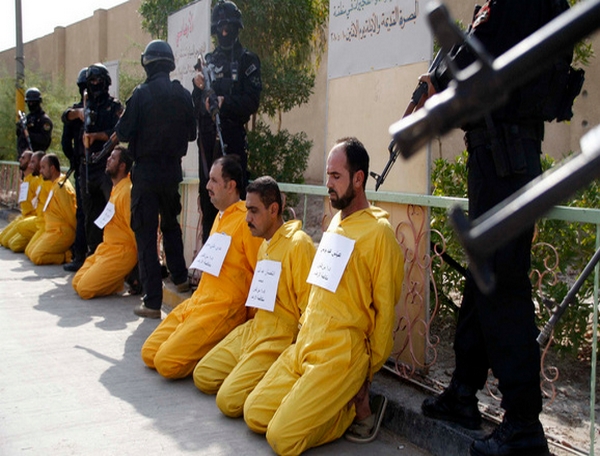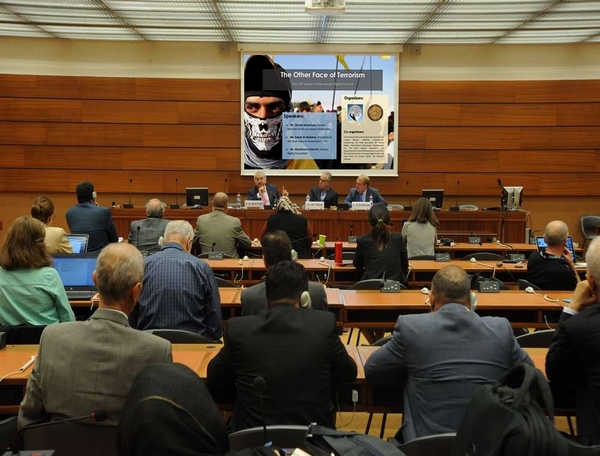Executions in Iraq, sectarian reprisals under combating terrorism?
Geneva, 3 February 2016
The Iraqi president Fuad Masum again, rushed to authorize a third batch of death sentences against innocent civilians convicted on terrorism charges and signaled upon relevant authorities for immediate execution. Authorities that often ignore international voices that condemn the death sentence and call for its immediate cease.
The Iraqi judicial system does not adhere to the basic international standards required for fair trial, and accepts inadmissible confessions extracted under torture while, using the death penalty within the pretext of fighting terrorism as means of revenge against opponents, and on political or sectarian grounds.
The Centre maintains to acknowledge that Mr Masum recognizes the unfairness, and continues to ratify death sentences, thinking that he will not be held accountable for the murder of hundreds of innocent Iraqi civilians who would have under the conditions of a fair trial faced a different verdict. The Centre also states that it has so often, highlighted to various UN organs the fact that Iraqi courts delivered verdicts using inadmissible evidence as basis of its judgments.
GICJ views that eliminating political opponents on the basis of ethnicity is the real reason behind the use of erratic execution decrees however, the Iraqi regime continues to use charges of terrorism as a justification of the death sentences in question.
As usual the Iraqi authorities did not publish a statement outlining the number of people affected by such frivolous provisions and the basis of their conviction. Instead, the statement provided concluded that the convicts ‘participated in terroristic activities that threatened the social and national security of Iraq.’
The center remains concerned as we realize that such templates are pursued to fulfill specific objectives against a definitive group or distinct personalities.
What is also worrying is the documented information that the GICJ received indicating, the presence of over 500 cases sentenced to death with 160 being under charges of terrorism. Moreover, The GICJ previously submitted proof to various UN organs documenting the fact that Iraqi courts often use evidence collected under torture as reference for conviction. Moreover, the Centre has documented that most convicts belong to geographic areas of similar ethnical identity (Al-Anbar, Nineveh, Salah Al-deen and Diyala.)
This only proves our thesis that the general practice is fueled with hatred and reprisal motives used by political parties and militia leaders which would contribute to the further destruction of the social fabric of the Iraqi society.
On another note, Iraqi judicial authorities use, extensively, the controversial Article 4 of the 2005 Anti-Terrorism law. The article connotes 50 acts (murder, grand theft, damage to public property…) under the notion of terrorism. In its efforts to shed light on the reality the Centre, highlighted the increase in the execution rate during the relative period and acquired documents indicating that:
-129 people were executed in 2012
-170 in 2013 (with 42 being executed within 2 day of October)
-36 in the first month of 2014.
Furthermore, the High Commission for Human Rights in Iraq announced that Iraqi authorities completed execution verdicts against 236 convicts within the past 2 years and that a further 720 convicts are due to be executed within the current year, taking into consideration that Iraq is ranked 3rd between countries with the highest death penalties.
Faced with these horrific numbers GICJ, can only enhance the call upon the international community, specifically the Human Rights Council and OHCHR to pressure the Iraqi authorities to halt the death penalty and awaits its ban.
Finally, Geneva International Centre for Justice would like to emphasis the utmost importance of effective and sustained action to save the lives of hundreds of Iraqis who have been driven to the death stand without having actually committed what is worth execution, taking into account that late intervention will not bring back lost lives.
Now, it is the responsibility of the United Nations, the responsibility of the Secretary-General and his representative to Iraq, it is the responsibility of the High Commissioner for Human Rights and all the UN bodies concerned with human rights. It is also the responsibility of all United Nations member states, especially those responsible for what happened in Iraq.
Link to the Arabic version of the report:
مركز جنيف الدولي للعدالة: أحكام الإعدام في العراق، انتقام طائفي بحجة مكافحة الإرهاب!
Documenting and reporting human rights violations in Iraq
| Executions | Human Rights Violations in the context of fight against terrorism | Peaceful protests | ||||
 |
 |
 |
||||
 |
 |
 |
||||








